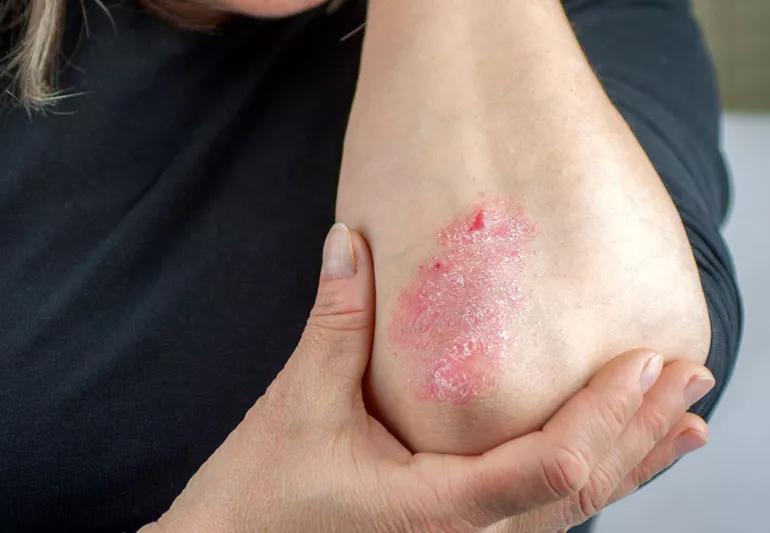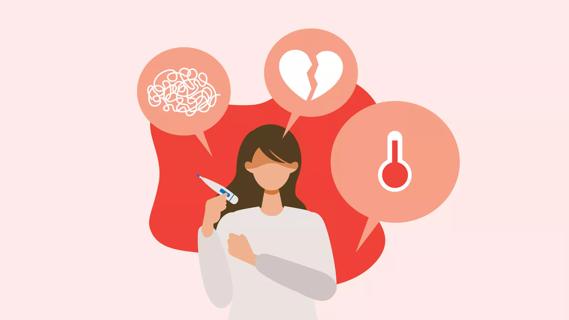From stomachaches and hives to sleepless nights and missed periods, stress can make an impact

For some, stress feels like your heart is about to explode out of your chest. For others, stress pops up on your skin as a rash or maybe you notice your hair falling out more than usual.
Advertisement
Cleveland Clinic is a non-profit academic medical center. Advertising on our site helps support our mission. We do not endorse non-Cleveland Clinic products or services. Policy
Stress is part of life — but it’s not always a bad thing. Sometimes, it gives you the motivation you need for hitting a deadline or performing your best. But unmanaged or prolonged stress can wreak havoc on your body, resulting in unexpected aches, pains and other symptoms.
Internal medicine physician Richard Lang, MD, MPH, and psychiatrist Susan Albers, PsyD, explain the connection between our mental stressors and how it affects our bodily functions.
While it may feel like stress is only occurring inside your head, it’s absolutely having an effect on the rest of your body. “Stress doesn’t necessarily cause certain conditions, but it can make the symptoms of those conditions worse,” says Dr. Lang. “When physical symptoms worsen, they may, in turn, increase a person’s level of stress, which results in a vicious cycle.”
Dr. Albers adds that stress can affect us in the short term and in the long run.
Advertisement
Chronic, or long-term stress, can lead to everything from weight gain to poor sleep and gut-related issues.
“Your body gets stuck in overdrive in that fight or flight response, and it can’t settle back down. So, your body becomes flooded with cortisol continuously,” Dr. Albers explains. “This causes inflammation, and it’s the inflammation that makes you vulnerable to chronic disease.”
Stress can do some strange things to your body, affecting it in various places. Here’s how stress can affect your body:
Stress can cause pain, tightness or soreness in your muscles, as well as spasms of pain. It can lead to flare-ups of symptoms of arthritis, fibromyalgia and other conditions because stress lowers your threshold for pain.
According to the American Psychological Association (APA), when you experience stress, your muscles tense up. When that stress goes away, your muscles release the tension.
Believe it or not, stress can affect your heart. A situation like trying to meet a deadline at work, for example, can make your heart rate increase. And too much of the stress hormone cortisol may make heart and lung conditions worse, including heart disease, heart rhythm abnormalities, high blood pressure, stroke and asthma. Alongside lung conditions, stress can also cause shortness of breath and rapid breathing.
If you have pain or tightness in your chest or heart palpitations, see a doctor as soon as possible to rule out a serious condition.
Even your skin and hair aren’t immune to the effects of stress. If you have a skin condition like eczema, rosacea or psoriasis, stress can make it worse. It also can lead to hives and itchiness, excessive sweating and hair loss.
Have you ever had a stomachache from being so stressed out? Stress can have a real impact on your digestive system — from simpler symptoms such as pain, gas, diarrhea and constipation to more complex conditions such as irritable bowel syndrome and acid reflux (GERD).
When stressed, you may have a tendency to eat more or less, which can lead to unhealthy diets. If the stress is severe enough, you may even vomit, too.
The effects of stress on your body can move through the tension triangle, which includes your shoulders, head and jaw.
“Stress can trigger tension headaches, tightness in the neck and jaw, and knots and spasms in your neck and shoulders,” notes Dr. Lang. “It also may contribute to TMJ, a jaw disorder.”
You need a strong immune system to fight disease, but stress weakens your body’s defenses.
“It makes you more likely to catch colds or the flu, for example,” warns Dr. Lang. “It also may make autoimmune conditions such as lupus and inflammatory bowel disease worse.”
Advertisement
Take care of your immune system by boosting it with healthy eating habits and exercise. Most importantly, training your immune system through stress reduction can be very effective in keeping you healthy.
Ever wonder why your period might sometimes skip a month or come a week late? There can be a range of reasons for this, but stress can absolutely be a contributing factor.
Unsurprisingly, this could put you in a vicious cycle of stress — where you’re worried or unsure when your next period is going to come. Continually missing periods due to stress could also lead to a hormonal imbalance or a condition called secondary amenorrhea.
Stress can also be a reason why you’re tossing and turning all night. A constant state of worrying puts your mind (and body) in a state of tension — maybe the stress manifests in the form of overthinking or spending the wee hours of the night awake and playing video games or scrolling through your phone.
Even worse, you may start to get stressed over the fact that you’re not sleeping — and so the cycle continues. Over time, sleepless nights due to stress can really do a number on your health, especially if you’re not getting your 7 to 9 hours. It could even lead to sleep disorders like insomnia.
Advertisement
Due to the natural stress hormone cortisol, your stress may also be impacting your weight. Cortisol is partially responsible for managing your metabolism, and when too much of it is released, it causes certain bodily functions to stop and your metabolism to slow down. Luckily, there are ways to get your cortisol levels in check and get them back to working for you and not against you.
Stress can bring on symptoms of depression and reduce your enthusiasm for activities you usually enjoy — from everyday hobbies to spending time with loved ones. If your stress becomes so consistent that it turns into endless worrying, you may even have an anxiety disorder. People also tend to eat poorly and exercise less when they’re stressed, which only makes mental health symptoms stronger.
Feeling low because of stress isn’t a personal failure. It happens to most of us, so don’t be afraid to reach out for help.
“If you’re having trouble getting to work, or you have changes in your sleep patterns or your appetite, these are some indications that your stress level may be out of control,” says Dr. Albers.
A single stressful day at work or an intense school assignment may be a type of stress you can shake off, but if it’s more than that, there are ways to feel better.
Advertisement
“We can treat the symptoms,” states Dr. Lang. “The real key is to find and treat the cause of the problem.”
Your doctor can help you with remedies such as stress management, counseling or anxiety-reducing medicine. And by working together as a team with your doctor, you’ll be on your way to a healthier you.
Learn more about our editorial process.
Advertisement

Even small moments of time outdoors can help reduce stress, boost mood and restore a sense of calm

Fill your coping toolbelt with healthy skills like getting outside, writing in a journal, volunteering, laughing or talking with a friend

We all experience some stress from time to time, but chronic stress can contribute to health issues like diabetes and cardiovascular disease

Getting outside, eating a healthy diet, taking up journaling, listening to music — even cuddling a pet — can provide stress relief

Give these 30+ grocery items a try to help find relief

In response to stress or danger, your brain responds by either defending itself, running away, stopping or reconciling

From nausea, weight gain and eczema, stress can affect your immune system in many ways

Stress hormones trigger cravings in an attempt to keep us safe from danger

Wearing a scarf, adjusting your outdoor activities and following your asthma treatment plan can help limit breathing problems

Your diet in the weeks, days and hours ahead of your race can power you to the finish line

When someone guilt trips you, they’re using emotionally manipulative behavior to try to get you to act a certain way